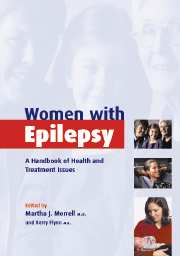Crossref Citations
This Book has been
cited by the following publications. This list is generated based on data provided by Crossref.
Irwin, Beth
2005.
Preconceptual care in epilepsy.
Independent Nurse,
Vol. 2005,
Issue. 4,
2005.
Handbook of Epilepsy Treatment.
p.
278.
Saramma, PP
Thomas, SV
and
Sarma, PS
2006.
Child rearing issues for mothers with epilepsy: A case control study.
Annals of Indian Academy of Neurology,
Vol. 9,
Issue. 3,
p.
158.
Turner, Katherine
Piazzini, Ada
Franza, Albertina
Canger, Raffaele
Canevini, Maria Paola
and
Marconi, Anna Maria
2008.
Do Women with Epilepsy Have More Fear of Childbirth During Pregnancy Compared with Women without Epilepsy? A Case‐Control Study.
Birth,
Vol. 35,
Issue. 2,
p.
147.
2008.
Gynäkologie in der chinesischen Medizin.
p.
298.
Thomas, SanjeevV
Sarma, PS
Nirmala, C
Mathai, Annamma
Thomas, SaraE
and
Thomas, AshaC
2013.
Women with epilepsy and infertility have different reproductive hormone profile than others.
Annals of Indian Academy of Neurology,
Vol. 16,
Issue. 4,
p.
544.
Singh, M
Bathla, Manish
Martin, A
and
Aneja, J
2015.
Hypoactive sexual desire disorder caused by antiepileptic drugs.
Journal of Human Reproductive Sciences,
Vol. 8,
Issue. 2,
p.
111.
Ebraheim, AsmaaM
Shamloul, RehamM
and
Talaat, Soha
2016.
Hormonal profile and clinical characteristics of epileptic females with abnormal ovarian morphology.
The Egyptian Journal of Neurology, Psychiatry and Neurosurgery,
Vol. 53,
Issue. 4,
p.
258.
Amini, Leila
Hematian, Marjan
Montazeri, Ali
and
Gharegozli, Korosh
2018.
Comparing the frequency of polycystic ovary syndrome in women with and without epilepsy.
Journal of Family Medicine and Primary Care,
Vol. 7,
Issue. 1,
p.
16.
Alshakhouri, Malak
Sharpe, Cynthia
Bergin, Peter
and
Sumner, Rachael L.
2024.
Female sex steroids and epilepsy: Part 2. A practical and human focus on catamenial epilepsy.
Epilepsia,
Vol. 65,
Issue. 3,
p.
569.





